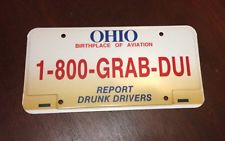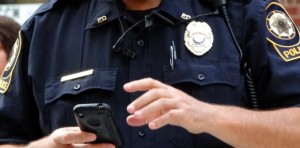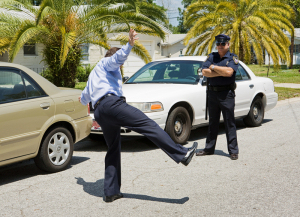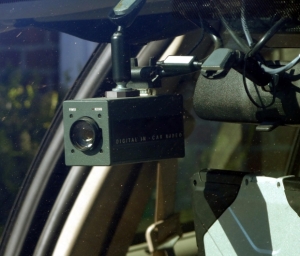 I heard a report that Geno Smith, quarterback for the Seattle Seahawks, was stopped for speeding and arrested on suspicion of DUI (called ‘OVI’ in Ohio). My first thought was, “speeding doesn’t sound like evidence of DUI”. It turns out Smith was allegedly going 96 mph in a 60 mph zone and driving erratically across several lanes of traffic (according to ESPN). That sounds more like evidence of DUI. Geno Smith’s case prompts the question: “what evidence, before a stop, indicates a driver may be under the influence?”
I heard a report that Geno Smith, quarterback for the Seattle Seahawks, was stopped for speeding and arrested on suspicion of DUI (called ‘OVI’ in Ohio). My first thought was, “speeding doesn’t sound like evidence of DUI”. It turns out Smith was allegedly going 96 mph in a 60 mph zone and driving erratically across several lanes of traffic (according to ESPN). That sounds more like evidence of DUI. Geno Smith’s case prompts the question: “what evidence, before a stop, indicates a driver may be under the influence?”
Articles Tagged with traffic stops in DUI/OVI cases
Ohio Supreme Court Upholds OVI/DUI Stop Based on Shouted Tip
 There are many different ways somebody can find themselves as the subject of an OVI/DUI investigation. The most common is when an officer witnesses a driver commit a traffic offense, initiates a traffic stop, and then conducts an investigation based on their observations of the driver. Other times, an officer will conduct the traffic stop after receiving a tip from someone that a particular driver may be impaired. How precise do these tips need to be to justify a traffic stop? How much corroborating evidence does an officer need to corroborate the tip? The Ohio Supreme Court recently weighed in on these questions in State v. Tidwell.
There are many different ways somebody can find themselves as the subject of an OVI/DUI investigation. The most common is when an officer witnesses a driver commit a traffic offense, initiates a traffic stop, and then conducts an investigation based on their observations of the driver. Other times, an officer will conduct the traffic stop after receiving a tip from someone that a particular driver may be impaired. How precise do these tips need to be to justify a traffic stop? How much corroborating evidence does an officer need to corroborate the tip? The Ohio Supreme Court recently weighed in on these questions in State v. Tidwell.
Appellate Court Rules On Validity Of Traffic Stop Leading To OVI Charges
 DUI cases (called ‘OVI’ in Ohio) are some of the most complicated cases filed in Ohio courts. From field sobriety tests to breath/blood/urine tests, there are many minute and highly technical details that can make or break an OVI defense in court. Often, a seemingly simple but no less important detail can get lost under the mountain of specialized evidence in OVI cases: why did the person get pulled over in the first place? And, more importantly for OVI defense: what degree of evidence does the prosecution need to present to justify that traffic stop?
DUI cases (called ‘OVI’ in Ohio) are some of the most complicated cases filed in Ohio courts. From field sobriety tests to breath/blood/urine tests, there are many minute and highly technical details that can make or break an OVI defense in court. Often, a seemingly simple but no less important detail can get lost under the mountain of specialized evidence in OVI cases: why did the person get pulled over in the first place? And, more importantly for OVI defense: what degree of evidence does the prosecution need to present to justify that traffic stop?
Ohio Supreme Court To Decide Legality Of Stops Based On Anonymous Tips
 If another driver becomes angry with you, that driver can easily call the police and report you as a drunk driver. The driver doesn’t have to give a statement to the police. In fact, the allegation can be completely anonymous.
If another driver becomes angry with you, that driver can easily call the police and report you as a drunk driver. The driver doesn’t have to give a statement to the police. In fact, the allegation can be completely anonymous.
Should police officers be permitted to stop you based only on another person’s anonymous tip? That question will be answered by the Ohio Supreme Court, as it recently agreed to hear the case of State v. Tidwell. The case could have broad implications, not for not just OVI cases, but for individuals’ Fourth Amendment protections in general.
Stop For Minor Offense Outside Officer’s Jurisdiction Is Unlawful
 Suppose you are driving around Columbus on I-270 and an officer pulls you over for speeding. The officer gets out of his cruiser and walks up to your car. When the officer reaches your window, you see on his uniform he is from the Cincinnati Police Department. ‘That’s odd’, you think, ‘why is an officer from Cincinnati making a traffic stop in Columbus?’ Good question. A better question is this: does that traffic stop violate your Constitutional rights?
Suppose you are driving around Columbus on I-270 and an officer pulls you over for speeding. The officer gets out of his cruiser and walks up to your car. When the officer reaches your window, you see on his uniform he is from the Cincinnati Police Department. ‘That’s odd’, you think, ‘why is an officer from Cincinnati making a traffic stop in Columbus?’ Good question. A better question is this: does that traffic stop violate your Constitutional rights?
When Are Police Permitted To Give Field Sobriety Tests?
 Imagine you are driving home on a central Ohio freeway after a late dinner and you are pulled over by a police officer. The officer says you were stopped for failing to use your turn signal when you changed lanes. The officer announces he smells the odor of alcohol and asks if you have been drinking. You did have a glass of wine with dinner. The officer then asks you to get out of the car for some field sobriety tests to “make sure you’re okay to drive”. Under what circumstances is the officer justified in doing this?
Imagine you are driving home on a central Ohio freeway after a late dinner and you are pulled over by a police officer. The officer says you were stopped for failing to use your turn signal when you changed lanes. The officer announces he smells the odor of alcohol and asks if you have been drinking. You did have a glass of wine with dinner. The officer then asks you to get out of the car for some field sobriety tests to “make sure you’re okay to drive”. Under what circumstances is the officer justified in doing this?
Dash Cam vs Officer Testimony In Ohio DUI/OVI Cases
 If an officer’s testimony about a traffic stop is not corroborated by the officer’s cruiser video, how do judges rule on the justification for a traffic stop? Once a judge makes a ruling, under what circumstances might that ruling be overturned by an appellate court? A recent case decided by the Tenth District Court of Appeals in Columbus, Ohio illustrates the discretion judges are given regarding evidentiary issues in OVI motion hearings.
If an officer’s testimony about a traffic stop is not corroborated by the officer’s cruiser video, how do judges rule on the justification for a traffic stop? Once a judge makes a ruling, under what circumstances might that ruling be overturned by an appellate court? A recent case decided by the Tenth District Court of Appeals in Columbus, Ohio illustrates the discretion judges are given regarding evidentiary issues in OVI motion hearings.
 Columbus OVI/DUI Attorney Blog
Columbus OVI/DUI Attorney Blog

